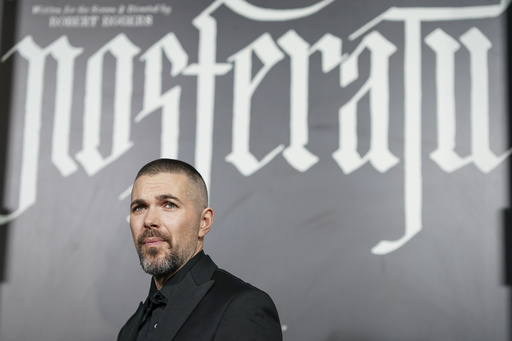
LOS ANGELES — Willem Dafoe has a distinct pattern when it comes to collaborating with directors—if he enjoys the experience, he is likely to jump at the opportunity to work with them again. At the age of 69, Dafoe has built a substantial roster of directors he has partnered with repeatedly, including notable names like Wes Anderson, Yorgos Lanthimos, Paul Schrader, Lars von Trier, and now Robert Eggers for a third time. Dafoe simply stated, “If it’s good, you come back.”
The two shared insights about Eggers’ film adaptation of “Nosferatu,” which premieres in theaters this Wednesday, along with the hurdles they faced during their first collaboration on “The Lighthouse,” released in 2019. The discussion also delved into the unique dynamic between actors and directors, providing a glimpse into their creative relationship.
In response to a question about his initial contact with Eggers, Dafoe recalled, “I want to meet you and I want to know who this filmmaker is.” He expressed that after watching “The Witch,” he was genuinely impressed. Dafoe reflected on how the film drew him in despite its historical context, remarking, “I enter it so easily. This is relevant. It’s rooted. It’s my story. I’m with these people.” He praised the film’s unique energy, stating that unlike many period films that feel self-referential, it created an immersive experience that compelled him to work with Eggers. After enjoying their collaboration on “The Lighthouse” and finding joy in his role in “The Northman,” when Eggers offered Dafoe a significant part as Professor Von Franz, he eagerly agreed.
Eggers confirmed that he couldn’t visualize anyone else for this particular role other than Dafoe, illustrating the strong connection they have forged over time. When asked about Dafoe’s performances prior to their collaboration, Eggers revealed a particular fondness for Dafoe in “Shadow of the Vampire,” where he portrayed Max Schreck. He recalled watching “Nosferatu” as a child and the impact it left him. He described the version he saw as having a mystical quality, which made it feel authentic. He appreciated Dafoe’s portrayal of Schreck, highlighting it as a captivating performance that contributed to the mythos surrounding the classic film.
The conversation then shifted to the nature of connections between directors and actors. Eggers acknowledged that while it takes time to establish trust, he felt an immediate connection during their first meeting. He described how mutual interests facilitate an easy conversation, establishing a good rapport early on. Dafoe echoed this sentiment, explaining that he felt a sense of belonging while discussing performance and creativity with Eggers. He noted that trust develops through shared experiences, especially when faced with unforeseen challenges during projects like “The Lighthouse.” Dafoe appreciates Eggers’ discipline and focus, which elevates the value of their collaborative work.
When prompted for specific challenges faced while filming “The Lighthouse,” both men chuckled, with Dafoe recalling a particularly memorable scene where he found himself buried alive in frigid conditions, delivering poetic dialogue. Despite the discomfort, he expressed admiration for such experiences that push him beyond his limits and foster personal growth. He conveyed that overcoming these obstacles leads to meaningful and curious experiences, reinforcing his enjoyment in the process.
In closing, Eggers shared his admiration for Dafoe, expressing that although he does not pursue Oscars, the actor certainly deserves one for his incredible body of work. Dafoe’s contributions to film remain significant, and their shared insights underscore a dynamic creative partnership rooted in trust and mutual respect.

